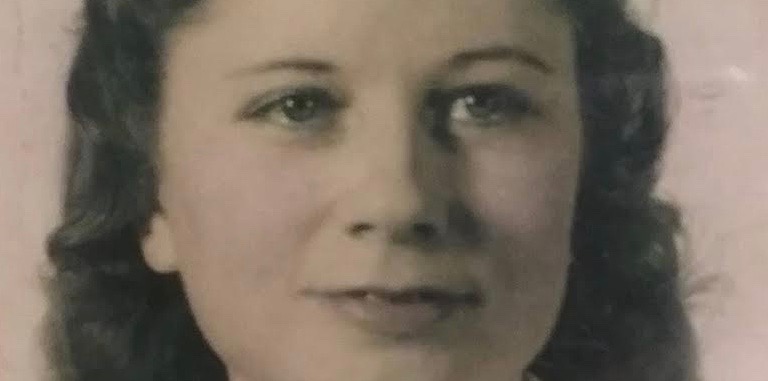“I Don’t Remember a Spring as Pretty as This”
By Kristin Davis
She leaves us on the first day of autumn, three days after my final visit to her dim room that smells faintly and relentlessly of urine; three days after I feed her spoonfuls of flavored ice between naps that come in startling stops and starts; three days after I discover her looking at me as if capturing my image to take with her to the place she will go to next.
Somehow I know I won’t see her again after that day, so I stare back, give her a hint of a smile that she doesn’t return. I hug her as close as the tubes and monitors will allow and tell her I love her.
She says, “I love you, too, Shug.”
I kiss her hand—long and slender like mine, though bruised from the IVs. She holds on and drops into sleep.
Daddy calls with the news those three days later–three hours after she closes her eyes and never opens them again–but I know it the instant it happens, even though I’m 200 miles from that double room where relatives wear masks, and a woman named Peggy from down the hall shuffles in several times a day to say hello and comment on the day’s menu. (“I cannot eat hot dogs,” she told us once, “because they remind me of a man’s wiener.”)
“I’m sorry, Shug,” Daddy says when he calls. I don’t cry at first, perhaps because I’ve been expecting it for a decade. Grandma’s health has been precarious for as long as I can remember, and I think that means I’ll be prepared.
“I knew it,” I say to Daddy. “I had this terrible feeling all day.”
I can’t remember my dreams from the night before, but the deep, unsettled feeling I woke up with somewhere in my chest has kept its hold on me ever since this morning.
Daddy says: “It’s not terrible, Shug.” But he’s wrong. It is.
***
Grandma was born in 1922 in Princeton, N.C., a town incorporated the same year the nation went to war with itself. She was the fourth of five girls, daughters of sharecroppers who scraped out a living on land they didn’t own. One of those girls, Cassie, would not live to see adulthood.
Grandma was three when it happened. A neighbor aimed a shotgun at Cassie and said he was gonna shoot her, not believing the gun was loaded. Then he pulled the trigger. Cassie ran around the yard twice before collapsing—at least that’s the story as Grandma remembered it. There was more grief to come. Too much grief. Her mother died when Grandma was five. She was orphaned six years later when her father dove into a too-shallow creek.
She’d been telling me for years that she was ready to go, and she said it again during another visit I made to see her one hot July night, right after they put her in the nursing home, a place she feared far more than death. She’d been in and out of hospitals for awhile, but this time was different. This time she must have known she wouldn’t be going back home.
All the sisters were gone by then. One sister, Lillian, had taken her own life more than forty years before; Ester and Cora Lee had been gone for some two decades.
Grandma was in the bathroom when I entered the room that night, so I sat on the standard-issue wing-back chair and waited. I heard the toilet flush and the water run and run. At last the door opened and she appeared, purplish hands gripping the curved arms of a walker, slippered feet sliding slowly across a hard floor.
I had seen her frail before; I had seen her in hospital beds more times than I could remember, but I had never seen her this way. She looked up, gave a little smile, the same one she always gave me when I showed up on weekends home from my new life in Virginia, and from college before that, and on random Friday nights as a teenager with friends before that. She gave us that same look whenever she turned from her pew and saw us peering through the high, square windows into the sanctuary at her church.
It was all I recognized of her.
Later, we sat outside in the fading light and I asked her about her mother and her father and Cassie. I asked her to tell me again how she’d heard Lillian’s voice in the hospital after she shot herself—Tell them I didn’t mean it. Tell them I didn’t mean it—although she couldn’t have heard it because Lillian was already dead.
I asked her about the time she spent in Biloxi, Mississippi, when my grandfather was in the Air Force in World War II, the only time she ever lived outside Eastern North Carolina.
I asked her about the birth of her third child, when she drifted out of her body and looked down on herself and heard God tell her that she could go back but the baby could not.
At some point, I left to get us a pair of little pizzas, and we ate together, Grandma perched on the edge of her bed and me in the only other chair in the room. Between us sat the rolling table with the sweating mauve pitcher I have seen in every sick room I have ever visited.
A dozen years earlier, when I worked as a cashier at the Piggly Wiggly in Goldsboro, just a few miles from her rent-controlled apartment, she had baked French bread pizzas for my dinner breaks, always with a bowl of iceberg lettuce and ranch dressing whipped together from sour cream and a seasoning packet. And when I was in second grade, the first year my parents no longer lived together and my sister and I were sent to an after-school program, it was Grandma who picked us up to take me there—always with sweet tea in glass Mason jars left over from canning. and a plastic bag full of sour cream and onion potato chips or peanut butter crackers she’d stuck together. She’d always wanted a snack after school when she was a girl, she told us, and she figured we’d want one, too.
***
The muted rug is bunched up beneath a big glass table sprouting a giant arrangement of somber flowers, and I wonder why no one has bothered to fix it. It is the first thing I notice when Daddy and I step into the funeral home with Uncle Ronny who smells of the cigarette he has just flicked into the parking lot. My cousin Brian, who is a dozen years older than me to the day, is close behind with his beautiful wife Carolyn, who smells like powder and soap. Her hair is black silk, her skin as smooth as amber. She looks perfect; I have never seen her any different.
I am suddenly self-conscious. I have not washed my hair in three days, and my shadowy eyes are swollen. I am in an old T-shirt and shorts, and I have not shaved my legs since I don’t remember when. A man approaches us from a glass office and speaks in a pleasant, sympathetic voice that does not patronize, and I decide that I like him, that I am glad he is the grand marshal in this final ceremony.
It is honorable work: retrieving stiff and limp bodies spotted with old age or shriveled from disease or perfect except for the evidence of some unexpected tragedy that has claimed them; dressing these bodies in suits and uniforms and Sunday dresses; arranging them in slick coffins topped with mounds of sweet blossom–life amid death, spring in winter.
“She is right this way,” the man tells us.
We are here for the pre-viewing. Here, I suppose, so that we are the first to see her, so that the shock or the grief or the reality of her death can pass privately, so we can manage tear-free smiles at the funeral service later when the distant relatives and old friends shake our hands or fold us in hugs and tell us what Grandma meant to them.
I am still not certain I want to see Grandma in a satin-lined coffin. I think I want to remember her in life. But I follow the pleasant mortician, who opens the door to the chapel and steps back to let us pass.
We are not an overly affectionate family. We hug sideways. I don’t know why. But now we are gripping each other, all of us, sliding our feet over soft carpet. Ronny coughs the first audible sounds of grief, and his body shakes.
“Mother,” he says. “Mother.”
Grandma wears a powder-blue gown with lacy cuffs that fall over slender, folded hands, hands like mine. I cannot take my eyes off her. I do not see life or death in her face. I think of an April day 20 years before, of blossoming dogwoods and lacy azaleas, of perfumed air and Grandma’s words as I stroll alongside her.
“It sure has been a pretty spring,” she says. “I can’t remember a spring as pretty as this.”
***
Kristin Davis is a writer who lives in Spotsylvania, Virginia. She penned her first story at age 6 in a 10-cent spiral notebook her mom bought too many of because they were on sale. Kristin spent more than 15 years as a newspaper reporter covering stories from town halls to military bases around the world. She works as communications director for a national service dog nonprofit, edits essays for a nonprofit newsroom, and still writes in a spiral notebook whenever she has time.


